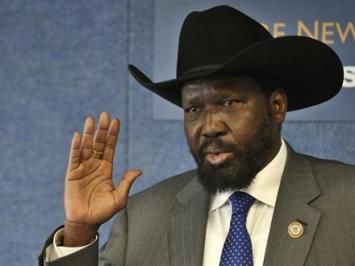S. Sudan president briefs elders on resolutions, reiterates commitment to peace
November 30, 2014 (JUBA) – South Sudan’s president Salva Kiir said his government remains fully committed to restoring peace to the country so as to avoid further loss of life.

The president said he had visited a military hospital in Juba earlier this month and was told by management that more than 1,888 wounded soldiers are being treated at the facility in the capital alone.
Kiir was attending the inauguration of a medical ward at Juba’s Giayeda military hospital, which was built through the contributions from the leadership of the South Sudanese army (SPLA) amid ongoing concerns over the urgency of the situation.
“You can see how this senseless war of Riek [Machar] has cost the country in terms of human lives and the destruction of the properties,” he said.
“This is why as a government we are trying our best to ensure that fighting stops. And this was why we accepted to sign the cessation of hostilities agreement because we do not want to fill the hospital with wounded soldiers,” he added.
Kiir was briefing elders, predominantly members of Bahr el Ghazal Dinka section, who had paid him visit to reassure him of their support, on recent resolutions from a leadership consultative meeting to discuss a peace proposal by the Intergovernmental Authority on Development (IGAD).
Kiir told the group that he would not go against the resolution of the consultative meeting, adding that the leadership wanted to hear their views and to act on the will of the majority.
“When we called the consultative meeting with our members and other stakeholders, it was because the peace talks were about the affairs of the country and so [we] wanted to hear from the people. That was why the consultation was cross cutting. It involved other political parties, the civil society, the faith-based groups, the opinion leaders, youth, women and all those who are concerned,” he said.
“We wanted the resolutions of the consultative conference to be forwarded to the IGAD as the basis of negotiation, which are actually in agreement with the 25 August proposal,” he added.
Kiir said he was willing to accept the outcome of the consultative meeting as the as the basis for future engagement on the peace process.
“I was ready to accept the outcome of the conference and act upon whatever people were going to say and agree as the solution to the conflict,” he said.
(ST)
